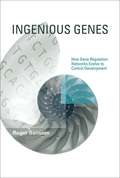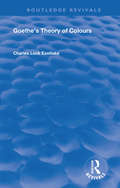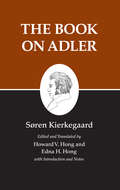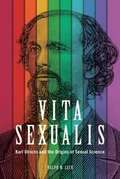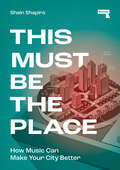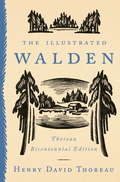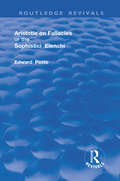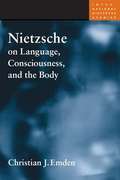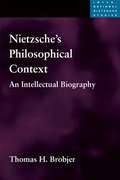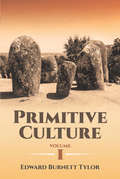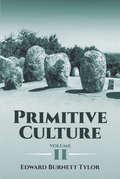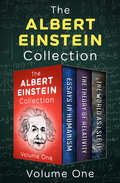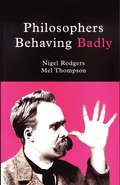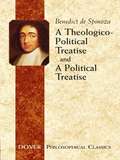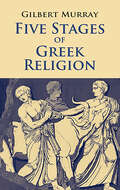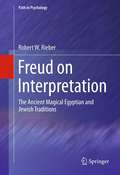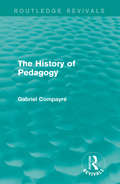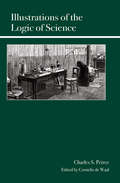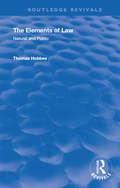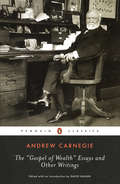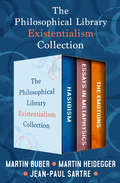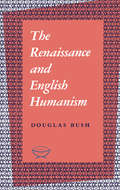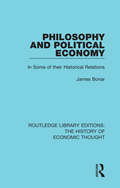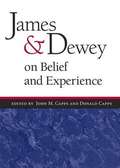- Table View
- List View
Ingenious Genes
by Roger SansomEach of us is a collection of more than ten trillion cells, busy performing tasks crucial to our continued existence. Gene regulation networks, consisting of a subset of genes called transcription factors, control cellular activity, producing the right gene activities for the many situations that the multiplicity of cells in our bodies face. Genes working together make up a truly ingenious system. In this book, Roger Sansom investigates how gene regulation works and how such a refined but simple system evolved. Sansom describes in detail two frameworks for understanding gene regulation. The first, developed by the theoretical biologist Stuart Kauffman, holds that gene regulation networks are fundamentally systems that repeat patterns of gene expression. Sansom finds Kauffman's framework an inadequate explanation for how cells overcome the difficulty of development. Sansom proposes an alternative: the connectionist framework. Drawing on work from artificial intelligence and philosophy of mind, he argues that the key lies in how multiple transcription factors combine to regulate a single gene, acting in a way that is qualitatively consistent. This allows the expression of genes to be finely tuned to the variable microenvironments of cells. Because of the nature of both development and its evolution, we can gain insight into the developmental process when we identify gene regulation networks as the controllers of development. The ingenuity of genes is explained by how gene regulation networks evolve to control development.
Goethe’s Theory of Colours: Translated From The German, With Notes (Routledge Revivals)
by Johann Wolfgang GoetheFirst published in German in 1810, this detailed volume was translated from the German by Charles Lock Eastlake and, in six parts, examines every aspect of Goethe’s theory of colours, including psychological colours, chemical colours, the moral effect of colour, minerals, plants, insects, mammals and a multitude of further subjects.
Kierkegaard's Writings, XXII
by Søren Kierkegaard Edna H. Hong Howard V. HongAs a spiritual autobiography, Kierkegaard's The Point of View for My Work as an Author stands among such great works as Augustine's Confessions and Newman's Apologia pro Vita Sua. Yet Point of View is neither a confession nor a defense; it is an author's story of a lifetime of writing, his understanding of the maze of greatly varied works that make up his oeuvre. Upon the imminent publication of the second edition of Either/Or, Kierkegaard again intended to cease writing. Now was the time for a direct "report to history" on the authorship as a whole. In addition to Point of View, which was published posthumously, the present volume also contains On My Work as an Author, a contemporary substitute, and the companion piece Armed Neutrality.
Vita Sexualis: Karl Ulrichs and the Origins of Sexual Science
by Ralph M. LeckKarl Ulrichs's studies of sexual diversity galvanized the burgeoning field of sexual science in the nineteenth century. But in the years since, his groundbreaking activism has overshadowed his scholarly achievements. Ulrichs publicly defied Prussian law to agitate for gay equality and marriage, and founded the world's first organization dedicated to the legal and social emancipation of homosexuals. Ralph M. Leck returns Ulrichs to his place as the inventor of the science of sexual heterogeneity. Leck's analysis situates sexual science in a context that includes politics, aesthetics, the languages of science, and the ethics of gender. Although he was the greatest nineteenth-century scholar of sexual heterogeneity, Ulrichs retained certain traditional conjectures about gender. Leck recognizes these subtleties and employs the analytical concepts of modernist vita sexualis and traditional psychopathia sexualis to articulate philosophical and cultural differences among sexologists. Original and audacious, Vita Sexualis uses a bedrock figure's scientific and political innovations to open new insights into the history of sexual science, legal systems, and Western amatory codes.
This Must Be the Place: How Music Can Make Your City Better
by Shain ShapiroThis Must Be the Place explores how music can make cities better.This Must Be the Place introduces and examines music&’s relationship to cities. Not the influence cities have on music, but the powerful impact music can have on how cities are developed, built, managed and governed.Told in an accessible way through personal stories from cities around the world — including London, Melbourne, Nashville, Austin and Zurich — This Must Be the Place takes a truly global perspective on the ways music is integral to everyday life but neglected in public policy.Arguing for the transformative role of artists and musicians in a post-pandemic world, This Must Be The Place not only examines the powerful impact music can have on our cities, but also serves as a how-to guide and toolkit for music-lovers, artists and activists everywhere to begin the process of reinventing the communities they live in.
The Illustrated Walden: Thoreau Bicentennial Edition
by Henry David ThoreauTo coincide with the bicentennial of Thoreau's birth and TarcherPerigee's publication of Expect Great Things: The Life of Henry David Thoreau, here is a sumptuous rediscovery edition of the first illustrated volume of Thoreau's classic, as originally issued in 1897.In 1897, thirty-five years after Thoreau's death, Houghton Mifflin issued a two-volume "Holiday Edition" of Walden illustrated with thirty remarkable engravings, daguerreotypes, and period photographs. In 1902 the publisher collected the work into a single volume. Now, to mark the bicentennial of Thoreau's birth in 1817, this timeless landmark is reproduced with all of the original illustrations and the complete text of his mystical, practical, magisterial record of a life in the woods.From the Trade Paperback edition.
Aristotle on Fallacies; or The Sophistici Elenchi (Routledge Revivals)
by Edward PosteFirst published in 1866, Aristotle on fallacies; or the Sophistici Elenchi, Poste explains Aristotles explanation of the nature of fallacies, if not satisfactory, seems to be as compete and intelligible as any that has since been offered.
Nietzsche on Language, Consciousness, and the Body
by Christian J. EmdenNietzsche and the philosopy of language have been a well trafficked crossroads for a generation, but almost always as a checkpoint for post-modernism and its critics. This work takes a historical approach to Nietzsche's work on language, connecting it to his predecessors and contemporaries rather than his successors. Though Nietzsche invited identification with Zarathustra, the solitary wanderer ahead of his time, for most of his career he directly engaged the intellectual currents and scientific debates of his time. Emden situates Nietzsche's writings on language and rhetoric within their wider historical context. He demonstrates that Nietzsche is not as radical in his thinking as has been often supposed, and that a number of problems with Nietzsche disappear when Nietzsche's works are compared to works on the same subjects by writers of the 18th and 19th centuries. Further, the relevance of rhetoric and the history of rhetoric to philosophy and the history of philosophy is reasserted, in consonance with Nietzsche's own statements and practices. Important in this regard are the role of fictions, descriptions, and metaphor.
Nietzsche's Philosophical Context: An Intellectual Biography
by Thomas H BrobjerFriedrich Nietzsche was immensely influential and, counter to most expectations, also very well read. An essential new reference tool for those interested in his thinking, Nietzsche's Philosophical Context identifies the chronology and huge range of philosophical books that engaged him. Rigorously examining the scope of this reading, Thomas H. Brobjer consulted over two thousand volumes in Nietzsche's personal library, as well as his book bills, library records, journals, letters, and publications. This meticulous investigation also considers many of the annotations in his books. In arguing that Nietzsche's reading often constituted the starting point for, or counterpoint to, much of his own thinking and writing, Brobjer's study provides scholars with fresh insight into how Nietzsche worked and thought; to which questions and thinkers he responded; and by which of them he was influenced. The result is a new and much more contextual understanding of Nietzsche's life and thinking.
Primitive Culture Volume I
by Edward Burnett TylorUse of the term "culture" as an expression of the full range of learned human behavior patterns began with this classic two-volume work, first published in 1871. Edward B. Tylor, the first Professor of Anthropology at the University of Oxford, declared that culture is "that complex whole which includes knowledge, belief, art, law, morals, custom, and any other capabilities and habits acquired by man as a member of society." Tylor is credited with the establishment of anthropology as a scientific discipline, and his groundbreaking work was highly influential in the development of cultural evolution as the foundation for anthropologic studies. Tylor's unilinear model of development maintains that humans share a common history, evolving from a single primitive form. His studies of the languages, rituals, and beliefs of societies from around the world pioneered the use of statistical data and substantiated his view of a universal pattern of development in all cultures. Volume I of Primitive Culture focuses on social evolution, language, and myth. Volume II focuses on Tylor's interpretation of animism in society, offering details of the endlessly varied ideas and beliefs regarding the soul, spirits, and gods.
Primitive Culture, Volume II: Researches Into The Development Of Mythology, Philosophy, Religion, Art, And Custom, Volume 2 - Primary Source Edition (Cambridge Library Collection - Anthropology)
by Edward Burnett TylorThe first Professor of Anthropology at the University of Oxford, Edward B. Tylor, defined the term "culture" for modern readers in this groundbreaking work. Initially published in 1871, this classic two-volume study explores the full range of learned human behavior patterns in terms of the beliefs, wisdom, laws, artistic achievements, and mores that constitute a society. The formation of anthropology as a scientific discipline began with this work, which continues to exercise a profound influence on anthropologic studies. The shared history of all humans, a common ground that evolved from primitive roots, constitutes the basis for Tylor's model of development. Drawing upon a worldwide variety of beliefs, rituals, and languages, the author illustrates an all-inclusive pattern of progress. His methods inaugurated the use of statistical data in anthropology, a standard procedure today but a landmark for his time. Volume I of Primitive Culture examines social evolution, language, and myth. The focus of this second volume is animism in society, which explores the tremendous diversity of thinking related to the concepts of the soul and religion as well as the marked similarities of spiritual beliefs.
The Albert Einstein Collection Volume One: Essays in Humanism, The Theory of Relativity, and The World As I See It
by Albert EinsteinThree captivating volumes reveal how Einstein viewed both the physical universe and the everyday world in which he lived. A century after his theory of general relativity shook the foundations of the scientific world, Albert Einstein&’s name is still synonymous with genius. This collection is an introduction to one of the world&’s greatest minds.Essays in Humanism Nuclear proliferation, Zionism, and the global economy are just a few of the insightful and surprisingly prescient topics scientist Albert Einstein discusses in this volume of collected essays from between 1931 and 1950. With a clear voice and a thoughtful perspective on the effects of science, economics, and politics in daily life, Einstein&’s essays provide an intriguing view inside the mind of a genius as he addresses the philosophical challenges presented during the turbulence of the Great Depression, World War II, and the dawn of the Cold War.The Theory of Relativity and Other Essays E=mc2 may be Einstein&’s most well-known contribution to modern science. Now, on the one-hundredth anniversary of the theory of general relativity, discover the thought process behind this famous equation. In this collection of his seven most important essays on physics, Einstein guides his reader through the many layers of scientific theory that formed a starting point for his discoveries. By both supporting and refuting the theories and scientific efforts of his predecessors, he reveals the origins and meaning of such significant topics as physics and reality, the fundamentals of theoretical physics, the common language of science, the laws of science and of ethics, and an elementary derivation of the equivalence of mass and energy. This remarkable collection, authorized by the Albert Einstein archives, allows the non-scientist to understand not only the significance of Einstein&’s masterpiece, but also the brilliant mind behind it.The World As I See It Authorized by the Albert Einstein Archives, this is a fascinating collection of observations about life, religion, nationalism, and a host of personal topics that engaged the intellect of one of the world&’s greatest minds. In the aftermath of World War I, Einstein writes about his hopes for the League of Nations, his feelings as a German citizen about the growing anti-Semitism and nationalism of his country, and his opinions about the current affairs of his day. In addition to these political perspectives, The World As I See It reveals the idealistic, spiritual, and witty side of this great intellectual as he approaches topics including &“Good and Evil,&” &“Religion and Science,&” &“Active Pacifism,&” &“Christianity and Judaism,&” and &“Minorities.&” Including letters, speeches, articles and essays written before 1935, this collection offers a complete portrait of Einstein as a humanitarian and as a human being trying to make sense of the changing world around him.This authorized ebook features new introductions by Neil Berger and an illustrated biography of Albert Einstein, which includes rare photos and never-before-seen documents from the Albert Einstein Archives at the Hebrew University of Jerusalem.
Philosophers Behaving Badly
by Mel Thompson Nigel RodgersAn engaging and often hilarious survey of the far-from-fusty extra-curricular activities of some of philosophy's finest practitioners Philosophers Behaving Badly examines the lives of eight great philosophers--Rousseau, whose views on education and the social order seem curiously at odds with his own outrageous life; Schopenhauer and Nietzsche, two giants of the 19th century whose words seem ever more relevant today; and five immensely influential philosophers of the 20th century, Russell, Wittgenstein, Heidegger, Sartre, and Foucault.
The Communist Manifesto
by Friedrich Engels Karl Marx Gareth Stedman JonesThe perfect books for the true book lover, Penguin's Great Ideas series features twelve more groundbreaking works by some of history's most prodigious thinkers. Each volume is beautifully packaged with a unique type-driven design that highlights the bookmaker's art. Offering great literature in great packages at great prices, this series is ideal for those readers who want to explore and savor the Great Ideas that have shaped our world. The Communist Manifesto changed the face of the twentieth century beyond recognition, inspiring millions to revolution, forming the basis of political systems that still dominate countless lives and continuing to ignite violent debate about class and capitalism today.
A Theologico-Political Treatise and A Political Treatise
by Francesco Cordasco R. H. Elwes Benedict De Spinoza2 important works. Spinoza's "A Theologico-Political Treatise" presents an eloquent plea for religious liberty, demonstrating that true religion consists of the practice of simple piety, independent of philosophical speculation. In the unfinished "A Political Treatise," the author develops a theory of government founded on common consent.
Five Stages of Greek Religion: The History Of The Olympian Gods Of Ancient Greece (hardcover)
by Gilbert MurrayBeginning with Greece's earliest rites, this volume traces the development of the classic religion of the Olympian gods and discusses the religion of the philosophic schools of the fourth century BC. It portrays the emergence of Christianity and concludes with an account of the efforts of Julian the Apostate to restore a new variety of paganism.
Freud on Interpretation
by Robert W RieberThis book presents new insights into Freud's famous "discovery" of the unconscious and the subsequent development of psychoanalytic theories. The authors explore the original context in which these ideas arose and the central debate about mind as matter or something that transcends matter. In the course of this examination, it is demonstrated that Freud was influenced not only by the 19th century scientific milieu, but also by ancient cultures. While it is known that Freud was an avid collector of ancient artifacts and generally interested in these older cultures, this book systematically investigates their profound effect on his thinking and theorizing. Two major influences, Egyptian mythology and Jewish mysticism are analyzed in terms of similarities to Freud's emerging ideas about the mind and its diseases. To further this line of investigation, Bakan supplies an illuminating discussion of what it means to interpret. Taken from the viewpoint that interpretation involves an u
The History of Pedagogy (Routledge Revivals)
by Gabriel CompayréPayne’s translation of Compayré’s The History of Pedagogy was initially published in 1886 due to a general lack of historical texts on education in the late nineteenth century. Compayré provides a thorough account of the doctrines and methods used by educators throughout history from educators of antiquity to the early nineteenth century. This text focusses on key thinkers and teachers such as Locke, Luther and Kant as well as considering the educational methods of the Greeks and the Romans. This title will be of interest to students of Education and Philosophy.
Illustrations of the Logic of Science
by Cornelis De Waal Charles Sanders PeirceCharles Peirce's Illustrations of the Logic of Science is an early work in the philosophy of science and the official birthplace of pragmatism. It contains Peirce's two most influential papers: "The Fixation of Belief" and "How to Make Our Ideas Clear," as well as discussions on the theory of probability, the ground of induction, the relation between science and religion, and the logic of abduction. Unsatisfied with the result and driven by a constant, almost feverish urge to improve his work, Peirce spent considerable time and effort revising these papers. After the turn of the century these efforts gained significant momentum when Peirce sought to establish his role in the development of pragmatism while distancing himself from the more popular versions that had become current. The present edition brings together the original series as it appeared in Popular Science Monthly and a selection of Peirce's later revisions, many of which remained hidden in the mass of messy manuscripts that were left behind after his death in 1914.
The Elements of Law: Natural and Politic (Routledge Revivals)
by Thomas HobbesOriginally published in 1889, Ferdinand Tonnies published versions of two works by Thomas Hobbes. His editions of The Elements of Law: Natural and Politic and of Behemoth: or The Long Parliament were the first modern critical editions, based on manuscripts of works by Hobbes. Completed in 1640, The Elements of Law was Hobbes's first systematic political work. The book helps us see Hobbes's mind at work, for it is the first version of his later political works.
The Gospel of Wealth Essays and Other Writings
by Andrew CarnegieWords of wisdom from American philanthropist Andrew Carnegie Focusing on Carnegie's most famous essay, "The Gospel of Wealth," this book of his writings, published here together for the first time, demonstrates the late steel magnate's beliefs on wealth, poverty, the public good, and capitalism. Carnegie's commitment to ensuring and promoting the welfare of his fellow human beings through philanthropic deeds ranged from donations to universities and museums to establishing more than 2,500 public libraries in the English-speaking world, and he gave away more than $350 million toward those efforts during his lifetime. The Gospel of Wealth is an eloquent testament to the importance of charitable giving for the public good. .
The Philosophical Library Existentialism Collection: Hasidism, Essays in Metaphysics, and The Emotions
by Martin Buber Martin Heidegger Jean-Paul SartreExplore the work of three great existential philosophers together in this collection. Hasidism: Zionist philosopher Martin Buber shares the results of forty years of study and introduces the philosophies of Hasidism to a Western audience. In this modern masterpiece, Buber interprets the ideas and motives that underlie the great Jewish religious movement of Hasidism and its creator, Baal Shem. Essays in Metaphysics: German philosopher Martin Heidegger presents two lectures in which he explores the nature of identity in the history of metaphysics. He offers illuminating insights on vital issues like technology, religion, language, history, and more. The Emotions: French philosopher Jean-Paul Sartre attempts to understand the role emotions play in the human psyche. Sartre analyzes fear, lust, anguish, and melancholy while asserting that human beings begin to develop emotional capabilities from a very early age, which helps them identify and understand the emotions&’ names and qualities later in life.
The Renaissance and English Humanism
by Douglas BushThe appearance of a fourth printing of The Renaissance and English Humanism indicated the scholarly success this book has enjoyed for more than a decade. As a brief yet thoughtful and eloquent evaluation of the influence of the Christian humanistic tradition upon our culture it has not been surpassed. The study is divided into four parts: in the first, Professor Bush discusses modern theories of the Renaissance; in the second and third, the character of classical humanism on the Continent and in England; and in the fourth, the place of Milton in the humanistic tradition."Douglas Bush has shown an unusual awareness," wrote Wallace K. Ferguson, "of the historiographical evolution of the Renaissance, and has taken his stand with rare explicitness on the side of those who find the Renaissance filled with mediaeval traditions." Professor Bush sees the dominant ideal of the English Renaissance as rational and religious order, rather than rebellious individualism, and his view has provided an important clue to the English literature and thought of the 16th and the earlier 17th century.
Philosophy and Political Economy: In Some of Their Historical Relations (Routledge Library Editions: The History of Economic Thought)
by James BonarThis classic text, first published in 1893, was the first attempt to present a view of the relations of philosophy and economics through the whole of their history. In tracing the history of this relationship the author begins by examining the work of the ancient philosophers and continues with the followers of the theory of natural law. He then explores the utilitarian economics and the ‘idealistic economics’. This title will be of interest to students of the history of economic thought.
James and Dewey on Belief and Experience
by Donald Capps John M. CappsDonald Capps and John Capps's James and Dewey on Belief and Experience juxtaposes the key writings of two philosophical superstars. As fathers of Pragmatism, America's unique contribution to world philosophy, their work has been enormously influential, and remains essential to any understanding of American intellectual history. In these essays, you'll find William James deeply embroiled in debates between religion and science. Combining philosophical charity with logical clarity, he defended the validity of religious experience against crass forms of scientism. Dewey identified the myriad ways in which supernatural concerns distract religious adherents from pressing social concerns, and sought to reconcile the tensions inherent in science's dual embrace of common sense and the aesthetic. James and Dewey on Belief and Experience is divided into two sections: the former showcases James, the latter is devoted to Dewey. Two transitional passages in which each reflects on the work of the other bridge these two main segments. Together, the sections offer a unique perspective on the philosophers' complex relationship of influence and interdependence. An editors' introduction provides biographical information about both men, an overview of their respective philosophical orientations, a discussion of the editorial process, and a brief commentary on each of the selections. Comparing what these foremost pragmatists wrote on both themes illumines their common convictions regarding the nature of philosophical inquiry and simultaneously reveals what made each a distinctive thinker.
